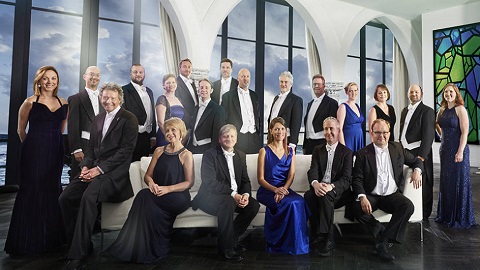But, no matter. This performance by Harry Christophers’ ensemble at Kings
Place was characteristically accomplished and well-composed, in terms of,
respectively, the singers’ assurance (though I’m not sure why Christophers
needed to employ pitch pipes between items, given the singers’ experience
and the harmonic clarity and focus of the works performed) and the balance
of compositional styles presented.
Britten’s ‘A Hymn to the Virgin’ (1931) opened proceedings, and here the
strengths of The Sixteen were obvious: the clarity of diction; the
persuasive nuance of suspension and dissonance; the give and take between
phrases which creates fluency; the independence of voices where necessary
which injects drama and vigour.
The programme included works by many women composers of the 20th
and 21st centuries. Ruth Byrchmore’s ‘Prayer of St Teresa of
Avila’ was noteworthy for the way harmonic stasis and movement were
opposed, creating a dynamism that flowered in rich timbral majesty. In
contrast, the lines of the composer’s ‘A Birthday (St Cecilia)’ seemed at
times to be swimming against each other, resulting in no less dynamic
urgency. The latter climaxed in a sustained proclamation, “my love is come
to me”, through which the female voices seemed to evolve from a human to an
instrumental to an almost abstract timbre.
We had two works by Cecilia McDowall, ‘Now may we singen’ and ‘Of a Rose’,
both of which recalled carolling traditions - and the spirit of John Rutter
- in their combinations of melody and drone, and the temporal flexibility
which seems to be a direct representation of linguistic veracity.
Similarly, there were two works by Margaret Rizza: ‘O speculum columbe’,
which sprayed its harmonic light like a fan of colour in the opening
stanza, and ‘Ave generosa’ which was one of the evening’s more individual
and engaging offerings, bringing together soprano and alto solos in a
complementary partnership and culminating in a blaze of jubilation: “Dei
Genitricem. Amen.” (Mother of God. Amen)
The programme did evince an occasional waft of ‘English gentility’:
Elizabeth Poston’s ‘Jesus Christ the apple tree’ was an exquisite dose of
Christmas-come-early; The Sixteen’s Kim Porter showed her choral nous in ‘Christmas Eve’, combining contrapuntal dialogue with
harmonic nuance. But any sense of comfort or complacency, however
beautiful, was challenged most creatively by Alissa Firsova’s ‘Stabat
Mater’, which foraged through piquant harmonic landscapes and sonorities,
exploiting false relation and flattened ‘blue notes’, and sculpting an
architectural expanse of quiet dignity. Similarly Peter Maxwell Davies’
‘Lullaby for Lucy’ made its mark without undue ceremony: as the text spoke
of “plants and creatures of the valley” which “Unite,/ calling a new/ Young
one to join the celebration”, so the music expanded organically from tenor
solo to tender intertwinings, culminating in startling luminosity: “Lucy
came among them, all brightness and light.”
Ironically, if there was one item that left me feeling a bit ‘bristly’ it
was Britten’s Hymn to Saint Cecilia. Though the text was well
articulated throughout, I longed for more rhythmic swing and suaveness at
the opening, to avoid the impression of English-country-house etiquette and
stiff-upper-lips. In the second section, “I cannot grow”, there was
precision but not tension: the counterpoint was precise but prim. The
tuning of some of the unison refrains was not entirely settled, though
there was a persuasive organ-like timbre and sonority at time for the
appeal, “Blessed Cecilia, appear in vision”; the pause on “Love me” at the
close of this second section was distinctly troubled intonation-wise.
With the arrival of the concluding Auden poem, “O ear whose creatures
cannot wish to fall”, I longed for more fluency of line: all was absolutely
accurate, but, for example, the men’s stepwise lines came across as
separate notes rather than a melodic sweep. And, this may be an entirely
personal preference or predilection, but I found soprano solo - though
powerfully sung by Julie Cooper - too empowered and vibrant: this is surely
an angelic song, and if we can’t have a boy soprano then we might have a
voice which approximates the abstract elevation of such? Similarly, when it
came to the poetic ‘punchline’, so to speak, I felt that Jeremy Budd’s solo
tenor proclamation, “O wear your tribulation like a rose”, needed greater
spaciousness to take in the import of the text; and that more precise
tuning of the chord supporting the fanfare-like declaration was required.
This work highlighted, too, the tendency of The Sixteen to over-sing in
this venue; they did not need to cast their utterances into a cathedral’s
sonic void that would magnify and return and enrich; the acoustic in Hall
One is excellent, the space fairly intimate. Less would have been more at
times.
Most affecting of all was Herbert Howells’ ‘Take him, earth, for
cherishing’, which is often said to have been commissioned following the
death of John F. Kennedy, though the real dedicatee is surely Howells’ son,
Michael, who died 28 years earlier from polio. The initial unison
challenged; imperatives, “Guard him well”, compelled; the counterpoint was
simultaneously knotty and dynamic: “Comes the hour God hath appointed/ To
fulfil the hope of men:” The plea to the Lord, “O take him, mighty Leader,
Take again thy servant’s soul”, was expansive and compelling. The final
prayer, “Take him, earth, for cherishing.”, was quietly touching.
Christophers sculpted a cathedral of sound, simultaneously gracious and
fragile.
Claire Seymour
The Sixteen:
Saint Cecilia
Harry Christophers (conductor)
Britten - Hymn to the Virgin, Ruth Byrchmore - Prayer of St Theresa of
Avila, Britten - Hymn to Saint Cecilia, Cecilia McDowall - Now May
We Singen, Margaret Rizza - O Speculum Columbe, Alissa Firsova - Stabat
Mater, Howells - Take Him Earth for Cherishing, Kim Porter - Christmas Eve,
Byrchmore - A Birthday (St Cecilia), McDowall - Of a Rose, Roxanna Panufnik
- Prayer, Elizabeth Poston - Jesus Christ the Apple Tree, Maxwell Davies -
Lullaby for Lucy, Rizza - Ave generosa.
Kings Place, London; Friday 29th November 2019.
